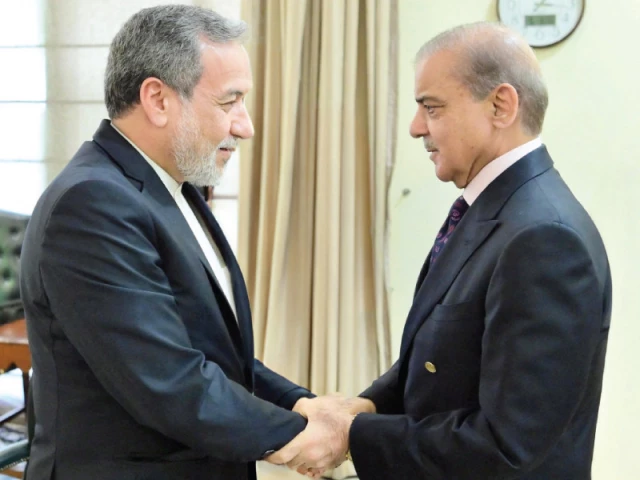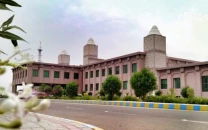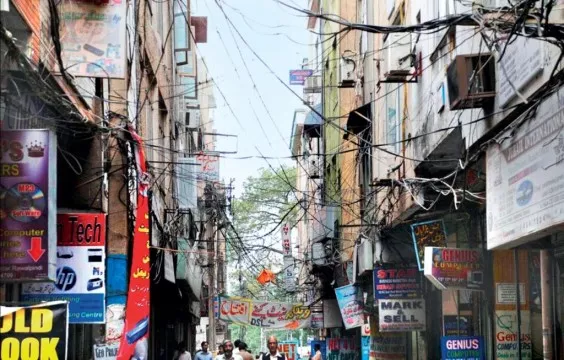Pakistan open to Iran mediating India tensions
Iranian FM meets president, PM, FM; talks focus on Pak-India tensions

Pakistan on Monday informed the visiting Iranian foreign minister that the country had no objection if Tehran acted as a mediator between Islamabad and New Delhi to ease brewing tensions, officials familiar with the development said.
Seyed Abbas Araghchi travelled to Islamabad on a previously unscheduled visit as part of Iran's efforts to seek de-escalation between India and Pakistan after the April 22 Pahalgam attack brought the two sides on the verge of another military standoff.
The top Iranian diplomat held formal talks with his Pakistani counterpart, Ishaq Dar, and separately met with President Asif Ali Zardari and Prime Minister Shehbaz Sharif. Araghchi is scheduled to visit New Delhi later this week and is expected to offer Iran's "good offices" to lower tensions between the two nuclear armed neighbours.
On April 26, the Iranian president spoke to both Indian and Pakistani prime ministers, urging restraint. Sources said that during a series of meetings, the Iranian foreign minister said that Tehran was ready to use its good ties both with India and Pakistan to reduce hostilities.
According to the sources, the Pakistani side told Araghchi that Islamabad had never been averse to the idea of third-party mediation and would welcome Tehran's effort in this regard. However, given India's long standing stance, New Delhi is certainly going to reject the idea of Tehran's involvement in the current crisis.
An official handout issued by the Prime Minister Office suggested that the ongoing tension between Pakistan and India was one of the major talking points. Shehbaz shared with Araghchi Pakistan's serious concerns over the prevailing tension in South Asia, as a result of India's provocative behaviour.
The prime minister categorically rejected any attempts to link Pakistan to the Pahalgam incident, without sharing any evidence. He said Pakistan had offered that an international transparent, neutral and credible investigation be conducted to ascertain the facts behind the incident.
While stating that Pakistan had acted with maturity and responsibility, the prime minister said that India had, on the other hand, created a media frenzy to divert the world's attention away from the Jammu and Kashmir dispute, which remained the root cause of instability in South Asia.
He also stressed that India's weaponisation of the Indus Waters Treaty was unacceptable, and a redline for the people of Pakistan. He reaffirmed Pakistan's resolve to work closely with Iran for peace, stability, and development in the region.
Foreign Minister Araghchi reaffirmed Iran's commitment to strengthening its relations with Pakistan and also playing its part in bringing peace and stability to South Asia. He also reiterated President Pezeshkian's invitation to the prime minister to undertake an official visit to Tehran during this year.
Earlier, Iran's Ambassador to Pakistan Reza Amiri Moghadam said that Araghchi, in his meetings with senior Pakistani officials, would discuss "ways of reducing tension in the Subcontinent" due to Iran's close ties with both India and Pakistan.
Foreign Minister Araghchi also met with the Deputy Prime Minister of Pakistan and Foreign Minister Ishaq Dar. The two sides, according to a Foreign Office statement, exchanged views on major regional and international developments.
Dar shared Pakistan's serious concerns over the prevailing tensions in South Asia as a result of India's provocative behaviour since the Pahalgam incident. He firmly rejected unsubstantiated attempts to implicate Pakistan in the incident, reiterating Islamabad's call for an international, transparent, and impartial investigation to establish the facts.
He further noted that such allegations appeared to be a tactic to divert global attention from the Jammu and Kashmir dispute. Emphasizing that Pakistan had consistently denounced terrorism in all its forms, Dar underscored the country's frontline role in the fight against terrorism and its significant sacrifices in this struggle.
The two sides reaffirmed their shared commitment to peace and stability in the region. They agreed to continue working closely to enhance mutual understanding and build a strong foundation for economic and strategic cooperation in the region.
The Iranian foreign minister also called on President Zardari, who apart from India-Pakistan tensions, discussed the current humanitarian situation in Gaza. Both sides strongly denounced the reckless Israeli policies.
Meanwhile, during a meeting with UK High Commissioner to Pakistan Jane Marriott, Prime Minister Shehbaz reiterated his offer for a "transparent, credible and neutral international investigation into the Pahalgam incident" and invited the UK to join it.
The Prime Minister Office Media Wing said in a press release that Shahbaz noted that with the support of friendly countries, including the UK, his government's foremost priority remained advancing economic growth and development of the country.
The prime minister said that Pakistan would never take any action that could imperil regional peace and security. He urged the UK, which enjoyed good relations with both Pakistan and India, to play its part in de-escalating the situation.
The British high commissioner thanked the prime minister for sharing Pakistan's position and said that the UK would work closely with Pakistan and India for maintaining regional peace and security, the press release stated.
Earlier, Chinese Ambassador to Pakistan Jiang Zaidong called on President Asif Zardari. During the meeting, the president India's actions after the Pahalgam attack posed a threat to regional peace and appreciated the Chinese government for its continued support to Pakistan in difficult times.
The Chinese ambassador reiterated the enduring and time-tested friendship between China and Pakistan and said that the two countries had always supported each other in difficult times. The ambassador said that China would always support Pakistan in achieving stability in South Asia.




















COMMENTS
Comments are moderated and generally will be posted if they are on-topic and not abusive.
For more information, please see our Comments FAQ